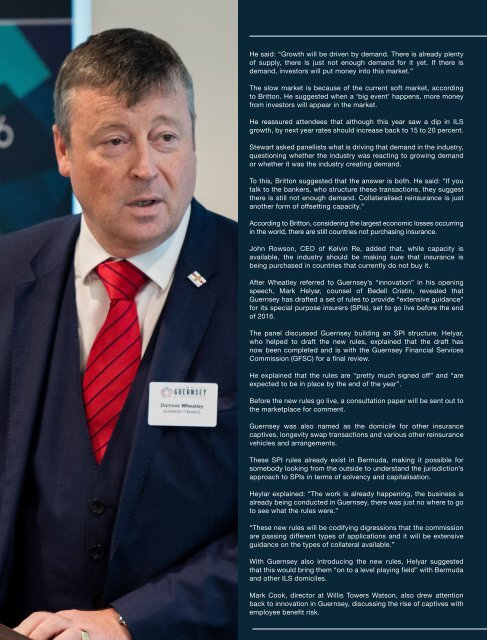The Great Guernsey
2dtvQWc
2dtvQWc
You also want an ePaper? Increase the reach of your titles
YUMPU automatically turns print PDFs into web optimized ePapers that Google loves.
He said: “Growth will be driven by demand. <strong>The</strong>re is already plenty<br />
of supply, there is just not enough demand for it yet. If there is<br />
demand, investors will put money into this market.”<br />
<strong>The</strong> slow market is because of the current soft market, according<br />
to Britton. He suggested when a ‘big event’ happens, more money<br />
from investors will appear in the market.<br />
He reassured attendees that although this year saw a dip in ILS<br />
growth, by next year rates should increase back to 15 to 20 percent.<br />
Stewart asked panellists what is driving that demand in the industry,<br />
questioning whether the industry was reacting to growing demand<br />
or whether it was the industry creating demand.<br />
To this, Britton suggested that the answer is both. He said: “If you<br />
talk to the bankers, who structure these transactions, they suggest<br />
there is still not enough demand. Collateralised reinsurance is just<br />
another form of offsetting capacity.”<br />
According to Britton, considering the largest economic losses occurring<br />
in the world, there are still countries not purchasing insurance.<br />
John Rowson, CEO of Kelvin Re, added that, while capacity is<br />
available, the industry should be making sure that insurance is<br />
being purchased in countries that currently do not buy it.<br />
After Wheatley referred to <strong>Guernsey</strong>’s “innovation” in his opening<br />
speech, Mark Helyar, counsel of Bedell Cristin, revealed that<br />
<strong>Guernsey</strong> has drafted a set of rules to provide “extensive guidance”<br />
for its special purpose insurers (SPIs), set to go live before the end<br />
of 2016.<br />
<strong>The</strong> panel discussed <strong>Guernsey</strong> building an SPI structure. Helyar,<br />
who helped to draft the new rules, explained that the draft has<br />
now been completed and is with the <strong>Guernsey</strong> Financial Services<br />
Commission (GFSC) for a final review.<br />
He explained that the rules are “pretty much signed off” and “are<br />
expected to be in place by the end of the year”.<br />
Before the new rules go live, a consultation paper will be sent out to<br />
the marketplace for comment.<br />
<strong>Guernsey</strong> was also named as the domicile for other insurance<br />
captives, longevity swap transactions and various other reinsurance<br />
vehicles and arrangements.<br />
<strong>The</strong>se SPI rules already exist in Bermuda, making it possible for<br />
somebody looking from the outside to understand the jurisdiction’s<br />
approach to SPIs in terms of solvency and capitalisation.<br />
Heylar explained: “<strong>The</strong> work is already happening, the business is<br />
already being conducted in <strong>Guernsey</strong>, there was just no where to go<br />
to see what the rules were.”<br />
“<strong>The</strong>se new rules will be codifying digressions that the commission<br />
are passing different types of applications and it will be extensive<br />
guidance on the types of collateral available.”<br />
With <strong>Guernsey</strong> also introducing the new rules, Helyar suggested<br />
that this would bring them “on to a level playing field” with Bermuda<br />
and other ILS domiciles.<br />
Mark Cook, director at Willis Towers Watson, also drew attention<br />
back to innovation in <strong>Guernsey</strong>, discussing the rise of captives with<br />
employee benefit risk.


